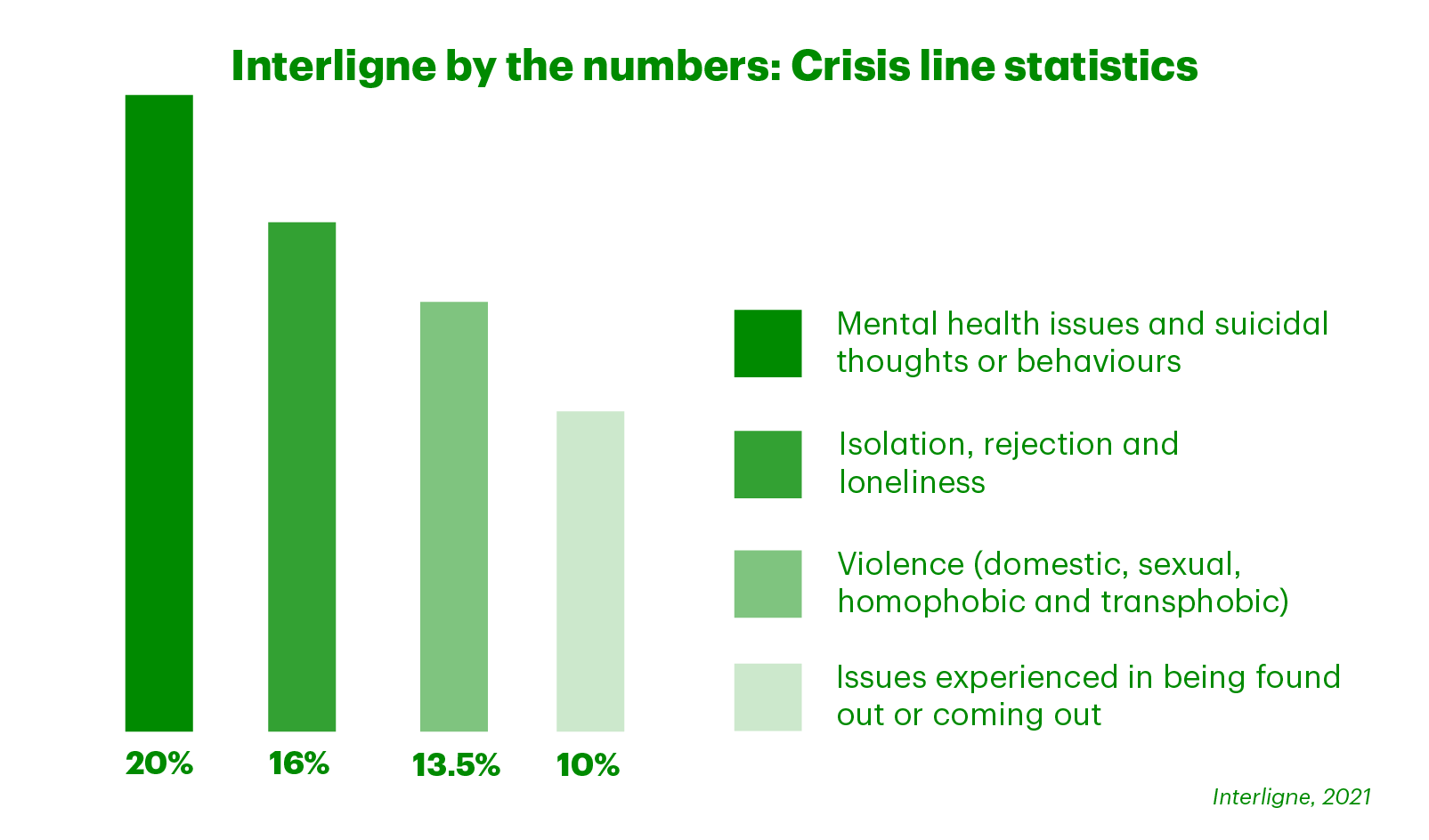Before the COVID-19 pandemic hit, Lucie's relationship with her partner was already becoming strained. And once government lockdowns began in Quebec in March 2020, the confinement on top of her relationship stress sent the 74-year-old into a deep depression.
"I was really not doing well, said Lucie, (not her real name to protect her privacy). "I was in a complex love situation and then I was in an advanced depression," she said.
Stories like Lucie's about increased isolation during the pandemic are not new for Johanne Audet, President of Interligne, a 24/7 Quebec-based front-line support and information center serving Canada's French-speaking LGTBQ2+ communities.
Yet Audet said she has never witnessed so much pain, suffering or isolation within the community as she did this past year.
Between 2019 and 2020, the number of people using Interligne's services jumped from 35,000 to 46,000. Audet says she knew immediately that the restrictions would have a profound impact on the LGBTQ2+ community and that LGBTQ2+ seniors would be even more affected.
"Seniors have been hit especially hard, as many of them still haven’t come out to their families for fear of being judged and rejected or simply don't have children or grandchildren to take care of them, so they rely on their chosen families even more."
But as community organizations in Quebec and across the country shut their doors to stem the spread of COVID, some members of the LGBTQ2+ community saw their social networks disappear overnight.
With seniors making up close to 13% of the LGBTQ2+ population in Canada and accounting for 14% of Interligne's client base, Audet and her team knew that they needed to expand their existing crisis helpline to meet the increase in demand for support and help LGBTQ2+ seniors find the community and help they were missing.
Be there for you: A program to fight isolation
The reasons people would call Interligne prior to the pandemic varied widely, but some of the most common reasons were related to mental health, violence, gender identity, sexual orientation and issues around coming out.
While those issues haven't changed, what has changed is the amplified feeling of distress many are experiencing due to the health and safety controls put in place due to the pandemic.
Interligne has been funded through the TD Ready Commitment since 2016, and in 2020 received a $500,000 grant through the 2020 TD Ready Challenge. With this grant funding, Interligne was able to expand its existing helpline services Être là pour vous (Be there for you): a support program that focuses on reducing isolation among seniors, racialized and Indigenous Peoples, youth, people with housing difficulties and people with mental health issues within LGBTQ2+ communities.
Among other initiatives, Être là pour vous organized a telephone buddy service where a volunteer is matched with a program participant – like Lucie for example – for regular calls to help keep the participant connected to the community while providing them the opportunity to talk to someone and feel heard. Seniors can simply register online or by phone to access the program.
Interligne will be using part of the grant funds to hire additional staff to handle the growing number of calls, and extending the program’s reach to struggling LGBTQ2+ community members In Quebec and Canada.
Audet says in some ways the buddy system gives many people the family they may have never had. For Lucie, Interligne provided more than a phone call – it became a lifeline.
"Opening up and talking about my situation allowed me to realize that I was in a abusive relationship that I had to get out of for my own safety," said Lucie.

Intergenerational LGBTQ2+ connections
Dominique (not his real name to protect his privacy) is a gay man in his late 20s who has used the organization’s services himself and has been volunteering with Interligne for four years. He remembers a recent conversation with an LGBTQ2+ senior who could no longer see his partner because of COVID-19 restrictions, and because he hadn’t disclosed his relationship to his family, he couldn’t justify travelling far from home to see his sweetheart.
“I was deeply moved because I could feel the person’s pain, anxiety, and immense sadness," said Dominique.
"I couldn’t help him see his boyfriend, but at least he could talk about his relationship. He could tell me about his feelings and the person he loved in his own words, without worrying about what he could and could not say,” Dominique explained.
Addressing social isolation and building resilience
“TD's support has been instrumental in helping to expand our crisis line team," said Audet.
"It has helped us to hire a coordinator who is in charge of recruiting volunteers and helping to develop new programs. As a result, we are now able to reach out to more people and create effective tools to better meet the specific needs of different communities."
With more volunteers available these days to provide assistance to people in distress within the LGBTQ2+ community, Audet is more optimistic about the future because she knows the additional support is making a real difference in the lives of those who need it.
